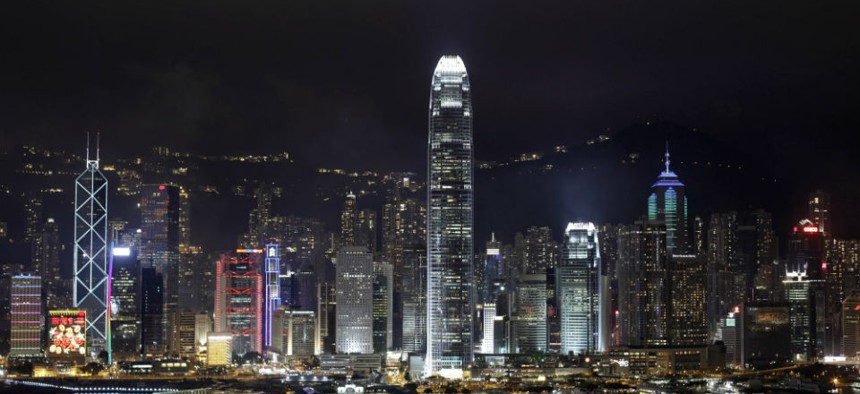Hacker Attacks and Pressure From Beijing Are Killing Free Speech in Hong Kong

The Hong Kong skyline Vincent Yu
Last week, targeted attacks briefly took down websites belonging to Next Media, a media group that has often been critical of Beijing.
When Deng Xiaoping sat down with Margaret Thatcher in 1984 to negotiate the terms of Hong Kong’s handover from Britain to China, they hammered out an agreement that became Hong Kong’s “basic law” and spelled out how China would govern the “highly autonomous” city. Among the rights accorded to all Hong Kong permanent residents are universal suffrage and freedom of speech, assembly, and demonstration.
But as Hong Kong gears up for the July 1 anniversary of that handover—activists expect crowds of up to half a million this year—many of those rights seem to be up in the air, and free speech is suffering.
Last week, targeted hacker attacks briefly took down websites belonging to Next Media, a media group that has often been critical of Beijing, and PopVote, a site asking residents how they would like the city’s next chief executive to be nominated. While no one can be sure about the source, much of the traffic in both incidents came from the mainland, and China’s hacker army is a top suspect. The city is so tense about censorship that when Facebook went down around the world last week, many residents blamed Beijing.
“This town is getting hard,” Mark Simon, a commercial director for Next Media who has lived in Hong Kong since 1991, told Quartz. The city is “now feeling that massive oppression from China.”
Next Media, which publishes the Apple Daily newspaper and makes popular animated cartoons about news events, has been the target of sometimes violentoffline attacks before. But in addition to the anonymous hacker attacks, HSBC and Standard Chartered recently pulled their advertising under instructions from Beijing. “The problem is economic,” Simon said. He’s battling with the foreign banks to try to convince them to advertise again.
“The gloves are off,” Shirley Yam, vice chair of the Hong Kong Journalists Association, recently told the Sydney Morning Herald. ”The party has always tried to impose its will, but now the way they do it is more brutal and direct.”
In a recent survey, Hong Kong journalists said media self-censorship was very common, as was censorship of news written about China’s central government. This year’s Reporters Without Borders press freedom survey notes:
China’s growing economic weight is allowing it to extend its influence over the media in Hong Kong, Macau and Taiwan, which had been largely spared political censorship until recently. Media independence is now in jeopardy in these three territories.
The hacker attack on Popvote was unprecedented in size and scope, said Matthew Prince, the chief executive of Cloudflare, a internet service provider that attempted to defend the site. Hackers directed 300 gigabytes per second of traffic at the website, or 200 packets per second. “It is an extremely large amount of traffic, the equivalent of what Google sees across their entire infrastructure” at one time, and all directed at a Hong Kong voting site, he said.
After Cloudflare’s executives defended the attack, a pro-Beijing newspaper in Hong Kong declared the company “aligned with the CIA.” (link in Chinese) For the record, Prince says Cloudflare “has no affiliation with the CIA, and actually a bit of a testy relationship with the US government.”
Less publicized events suggest Beijing is cracking down on other fronts as well. Earlier this week, three members of Taiwan’s “Sunflower Movement” which brought thousands of protests onto the streets of Taipei earlier this year, were denied visas to Hong Kong.
NEXT STORY: FBI issues phish warning to feds





